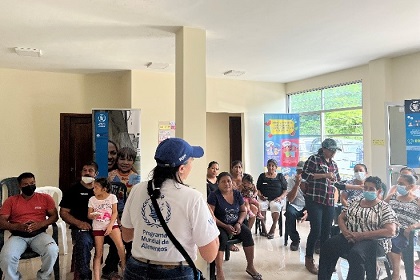Joint Programme on Gender Transformative Approaches
for Food Security and Nutrition




Training of Trainers in Ecuador: Strengthening knowledge in gender transformative approaches, food security and nutrition
13 JUNE 2022

As part of the activities of the Joint Programme on Gender Transformative Approaches for Food Security and Nutrition (JP GTA), the World Food Programme (WFP) opened a cycle of “Training of Trainers” workshops in Manta in the province of Manabí in Ecuador to support the National Agricultural Strategy for Rural Women led by the Ministry of Agriculture and Livestock.
The JP GTA is implemented by the three United Nations Rome-based Agencies FAO, IFAD and WFP in collaboration with and through financial support from the European Union. In Ecuador, the JP GTA works to support rural women in the provinces of Imbabura and Manabí.
The workshops aim to improve livelihoods and production in agriculture by addressing the root causes of inequalities that impact food security and nutrition for men and women. By strengthening the facilitation capacities of the Ministry’s technical staff through a human centered approach, the workshops seek to create learning opportunities with farmers from Imbabura and Manabí to sensitize communities about healthy habits, responsible production and gender equality.
During the session, effective and unconventional education and communication tools were introduced – such as theatre, games and role play – that allowed the participants to take an active part in the learning process. These tools and other useful examples that were generated in the session will be put into practice in subsequent visits to the field.
Cristina Vera, WFP’s JP GTA National Programme Coordinator, highlighted the urgency to promote agroecological practices to improve the quality of the products consumed by the most vulnerable families. She also stressed the importance of creating spaces where women and men are given equal access to resources, opportunities and participation. Work is being conducted in a coordinated manner and at all levels, to achieve the development of a country in which no one is left behind.
The workshops will be replicated in the province of Imbabura in order to transfer new concepts to improve the nutrition of farmers and their families. Camila Gómez, a technical expert of the Ministry of Agriculture and Livestock for the district office in Imbabura, noted that WFP’s contributions were a great help for the development of the National Agricultural Strategy for Rural Women. She added that the graduation of rural participants from the training modules is an important step also for the Ministry’s district technical experts who accompany their process.
“The level of rapport that the technical experts are able to acquire with the farmers builds the farmers’ confidence to express their gendered challenges and find a solution,” said Alexandra Nicolalde, also from the Ministry of Agriculture and Livestock, working for the district office in Imbabura.
By strengthening knowledge on food security, nutrition and sustainable production, the JP GTA seeks to narrow gender gaps in a sector where the work of men and women and their access to resources should be recognized equally.
Image: © WFP Ecuador
Read also:
- United Nations Ecuador (in Spanish): Formador de formadores, una estrategia para reforzar los conocimientos en seguridad alimentaria y nutricional
- Manabí blog: ¡Por una mejor Seguridad Alimentaria y Nutrición de los manabitas!
To learn more:
- JP GTA website: https://www.fao.org/joint-programme-gender-transformative-approaches/
- JP GTA flyer (in English): https://www.fao.org/publications/card/en/c/CB7065EN
- JP GTA flyer (in Spanish): https://www.fao.org/publications/card/es/c/CB7065ES
Contacts:
- Andrea Vera, Communications Assistant for the JP GTA in Quito, Ecuador: [email protected]
- Narcisa Villavicencio, WFP Gender Assistant for the JP GTA in Manabí, Ecuador: [email protected]
- JP GTA: [email protected]
